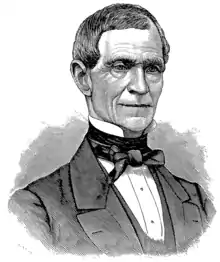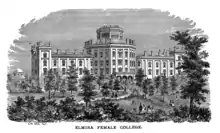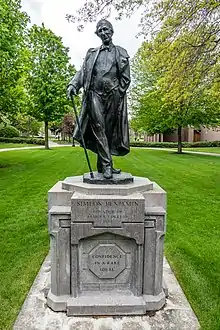Simeon Benjamin
Simeon Benjamin (May 29, 1792 — September 1, 1868) was a businessman, philanthropist, and founder of Elmira College.
Simeon Benjamin | |
|---|---|
 | |
| Born | May 29, 1792 Upper Aquebogue, New York |
| Died | September 1, 1868 (aged 76) Upper Aquebogue, New York |
| Resting place | Woodlawn Cemetery |
| Nationality | United States |
| Occupation | Businessman and philanthropist |
| Known for | Founder of Elmira College |
| Spouse(s) | Sarah Wickham Goldsmith |
Early years
Simeon Benjamin was born on May 29, 1792, in Upper Aquebogue, in the Town of Riverhead, New York on Long Island.[1][2] He was the third of eight children.[2]
Because Benjamin was considered a feeble child, he was allowed experience working as a clerk in a country store in Aquebogue.[2] At age 16, he clerked for two years in a store on Broadway in New York City, then at the start of the War of 1812 returned to Aquebogue to open his own dry goods store there.[2] Benjamin prospered during the war, as his location in Riverhead enabled his store to avoid the blockade that otherwise prevented goods from reaching New York.[2]
After the conclusion of the War of 1812, Benjamin returned to New York City where he operated a successful dry goods store at 371 Pearl Street for 20 years.[1]
Elmira years
Benjamin, having made a fortune in New York, moved to Elmira, New York in 1835 and began buying up real estate in town.[1][2] Benjamin's fortune grew as Elmira expanded.[2] Benjamin built churches, schools, and hotels in town, and helped establish a railroad connection between Elmira and Seneca Lake.[2]
He later became president of the Chemung Railroad, vice president of the Elmira Rolling Mills Company, and president of the Bank of Chemung and the First National Bank.[1] His wealth grew so considerable that he was considered for many years to be the wealthiest person in Chemung County.[3]
During his entire time in Elmira, Benjamin lived at 500 Lake Street, at the corner of East Third Street. At the time it was considered "well out in the country."[4]
Benjamin was active for 30 years in Elmira's First Presbyterian Church; he was a trustee of the church, and became an elder in 1836.[1][2]
Philanthropy
Elmira College

When plans to charter a women's college in Auburn, New York ran into financial difficulty, Benjamin pledged $5,000 to transfer the charter to Elmira. Benjamin became treasurer and chairman of the Board of Trustees of the new Elmira Female College.[1] Elmira College was founded to be "a real college for women which shall be higher and better than any female institution in the country."[1]
Benjamin selected the college's location on Prospect Hill, and it opened there on October 2, 1855, with 242 students.[1] Benjamin's total contribution to Elmira College over the course of his life and his will totaled $80,000.[1][2]
Other works
Benjamin's charitable work extended beyond Elmira college. He donated $10,000 during his lifetime, and bequested $20,000 in his will, to Hamilton College, where he was a trustee.[2] He was also a trustee of Auburn Theological Seminary, to which he donated $10,000.[2] He also gave $2000 to the Elmira Orphan Asylum.[2]
Records indicate that Simeon Benjamin attended anti-slavery meetings.[5] He also provided support in the form of "food, clothing, and cash"[6] to the anti-slavery movement through the work of John W. Jones, a former slave who was Elmira's main "agent" of the Underground Railroad.[7][8][5]
Personal life
Benjamin was widely active in Presbyterian Churches in Aquebogue, Brooklyn, and Elmira.[2] He supported the Temperance movement and abolition, and he had connections to the Underground Railroad.[1]
Benjamin married Sarah Wickham Goldsmith, of Mattituck, New York. They had three sons and four daughters; all but one son and one daughter died in childhood. William, the surviving son, died shortly after graduating from Williams College. The surviving daughter married John T. Rathbun, of Elmira.[1]
In 1867, Benjamin became ill with "bronchial affection" and diarrhea, and was largely confined to his home for over a year, unable to climb steps without assistance.[9] Despite these health problems, he took his annual trip, accompanied by his daughter, to his birthplace in Riverhead, Long Island to visit his nephew.[9] Benjamin died there on September 1, 1868, with his daughter by his side.[9] His body was returned to Elmira for burial in Woodlawn Cemetery.[10]
Legacy

A statue of Benjamin stands on the Elmira College campus.
A song about Benjamin was composed by an Elmira College sophomore in 1958.[1]
External links
References
- Hare, Jim (14 December 2019). "Elmira History: Elmira College founder Simeon Benjamin was ahead of his time". Star Gazette. Retrieved 25 May 2020.
- Pierce, HB (1879). texts History of Tioga, Chemung, Tompkins and Schuyler counties, New York. Philadelphia: Everts & Ensign. p. 262. Retrieved 25 May 2020.
- Towner, Ausburn (1892). Our County and Its People, A History of the Valley and County of Chemung, from the Closing Years of the Eighteenth Century. Syracuse, NY: D. Mason & Co. p. 168. Retrieved 25 May 2020.
- Knowlton, Carole. "Friends and Neighbors: Abolitionists in Elmira". Tri-Counties Genealogy & History by Joyce M. Tice. Retrieved 25 May 2020.
- Ramsdell, Barbara S. (2002). "The John W. Jones Story". John W. Jones Museum. Archived from the original on 25 May 2020. Retrieved 25 May 2020.
- Snodgrass, Mary Ellen (2015). The Underground Railroad: An Encyclopedia of People, Places, and Operations. p. 298. ISBN 9781317454168. Retrieved 25 May 2020.
Aiding the Jones with clothing, food, and cash were ... Simeon Benjamin
- "First Baptist Church of Elmira". National Park Service. Retrieved 25 May 2020.
- Dworkin, Rachel. "Conspiracy in the Underground". Chemung County Historical Society. Retrieved 25 May 2020.
- "Death of Simeon Benjamin". Elmira, New York: Elmira daily advertiser. 2 September 1868. p. 4. Retrieved 26 May 2020.
- "Biographical Pamphlet Prepared on Approach of 75th Anniversary". Elmira, New York: Star-Gazette. 23 May 1930. p. 10. Retrieved 25 May 2020.